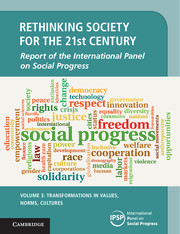Book contents
- Rethinking Society for the 21st Century
- Rethinking Society for the 21st Century
- Copyright page
- Contents
- Introduction to Volume 3
- Transformations in Values, Norms, Cultures
- Concluding Chapters
- 21 The Multiple Directions of Social Progress: Ways Forward
- 22 The Contribution of the Social Sciences to Policy and Institutional Change
- Volume 3 Authors
- Index
- References
21 - The Multiple Directions of Social Progress: Ways Forward
from Concluding Chapters
Published online by Cambridge University Press: 05 July 2018
- Rethinking Society for the 21st Century
- Rethinking Society for the 21st Century
- Copyright page
- Contents
- Introduction to Volume 3
- Transformations in Values, Norms, Cultures
- Concluding Chapters
- 21 The Multiple Directions of Social Progress: Ways Forward
- 22 The Contribution of the Social Sciences to Policy and Institutional Change
- Volume 3 Authors
- Index
- References
Summary

- Type
- Chapter
- Information
- Rethinking Society for the 21st CenturyReport of the International Panel on Social Progress, pp. 815 - 846Publisher: Cambridge University PressPrint publication year: 2018
References
- 2
- Cited by



